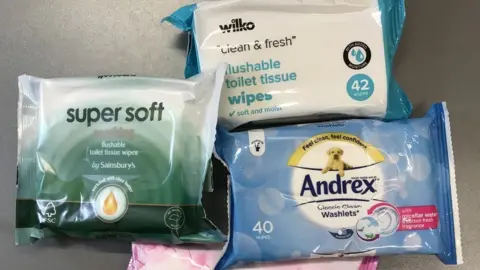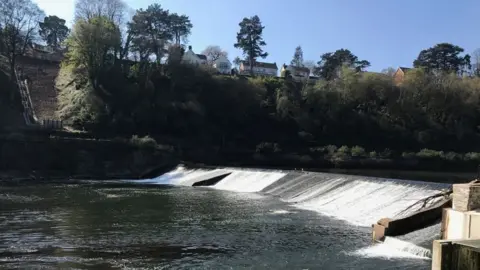Plastic wet wipes: Call for ban over sewer blockages
 BBC
BBCThere are calls for Wales to consider banning non-biodegradable wet wipes and urgently fund more research into microplastics in rivers.
A new report by AMs has accused ministers of "not getting to grips with the scale of the problem".
It says new targets are needed for tackling plastic waste, similar to those in place to cut carbon emissions.
The Welsh Government said it was already acting on many of the report's recommendations.
Welsh Water said non-biodegradable wet wipes were causing 2,000 sewage blockages in Wales each month.
After carrying out an inquiry into plastic, the assembly's climate change committee said it had been "disappointed" by the actions ministers had taken so far.
Plastics 'in food chain'
It called for a "comprehensive, ambitious 10-year strategy" to be put together and implemented.
"We shouldn't wait for others and must take the lead where we can," the committee's chair, Labour AM Mike Hedges, said.
"The public are supportive - we must harness their energy and enthusiasm and bring forward ambitious and transformative policies."
Plastics do not biodegrade - but break down over time into smaller and smaller fragments known as micro or nano plastics.
They have been found in the soil, rivers and sea - and are known to be ingested by organisms throughout the food chain.
The committee said it had been shocked to be presented with research by Cardiff University which found half of all insects in the Taff river system contained plastic.
Steve Ormerod, who led the work, told the inquiry "densities of plastic particles on the river bed sometimes can be as much as 0.5 million particles per square metre.

"That's much, much more plastic than, in fact, the living organisms present on the bed of the river."
Other recommendations include a deposit return scheme for "the broadest variety" of drinks containers as well as extended producer responsibility rules so that manufacturers shoulder more of the cost of dealing with their products after they have been used.
It also suggests bringing in a plastic packaging tax as a financial incentive to use recycled plastics instead of new ones.
Reduce and reuse
While the AMs said the Welsh Government should be praised for its very high recycling rates and for being the first UK nation to put a levy on single-use shopping bags, they claimed overall progress on tackling plastic waste had been "lacking".
A focus on reducing and reusing goods should be urged, they said - with recycling being a last resort.
A deposit return scheme has yet to be implemented in Wales, despite funding being allocated, and although research had been commissioned on extended producer responsibility rules there has been no announcement yet about whether they would be brought in.
"Stakeholders are, understandably, concerned about this apparent inertia," the report concluded.
A Welsh Government spokesperson said it was already acting on many of the recommendations, including work on a deposit return scheme and banning a range of single-use items.
"We are ambitious about tackling waste and increasing recycling and we share the public's enthusiasm to do more," the spokesperson said.
